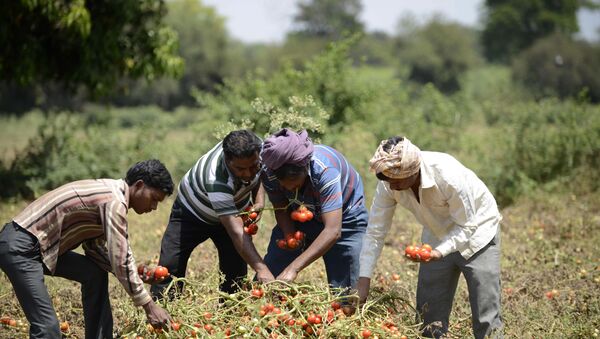Indian farmers fear that lowering the import tariffs on various farm commodities will hurt their prospects in the market. The RCEP is a trade pact in which the signatories agree to reduce or abolish tariffs on imports and exports.
The pact is imperative to India as nearly 20 per cent of its exports go to members of RCEP, and 35 per cent of its imports are also from this bloc.
Krishnabeer Chaudhary, President of India's prominent farmers' trade union and former member of the agriculture policy-making committee, told Sputnik that the welfare of farmers should be the government's priority.
"The Indian government has promised to double farmers' incomes but allowing imports at low tariffs will put pressure on our ill-equipped farmers, who will be left to compete with countries that receive heavy production subsidies from their respective governments," he said.
On being asked whether opting out of the pact may incur an economic loss for the country, he said India is currently going through a slowdown, and the economy can only be revived if the government focuses on improving the abysmal state of Indian agriculture.
The Indian government has also, through a provision, included the dairy segment in the agreement –opening up a huge market for Indian milk producers with zero to low tariffs.
Claiming that development in the sector is gradually taking place, Chaudhary said the government should provide production-based subsidies to farmers, especially in the dairy sector, because rearing animals includes a plethora of cost-intensive practices and there was no margin left for dairy farmers.
Not just the farm sector, but small scale manufacturing companies are also dreading the impact of the agreement.
China is at the forefront of pushing the RCEP as the country, after further relaxation of tariffs, would be able to penetrate deeper into the Indian market. The Dragon is gradually expanding its footprints in the Southeast Asia region, which makes it even more critical for India to stay in the deal.
Rahul Singh, an expert in economy and trade, on the other hand, told Sputnik that bilateral and multilateral trade pacts are a product of globalization. "The collaboration (RCEP) will offer Indian farmers an economy of scale, and the demand volume will increase and will directly benefit farmers. Such polarization was expected as the multipolar group of nations are writing on the wall as globalization is not working well at present," he added.
RCEP aims to create a free trade zone that includes half of the world's population and 34 per cent of its global gross domestic product.


